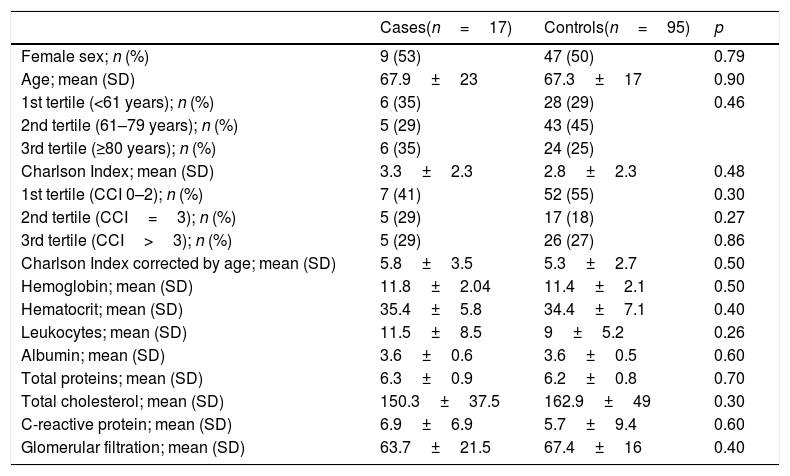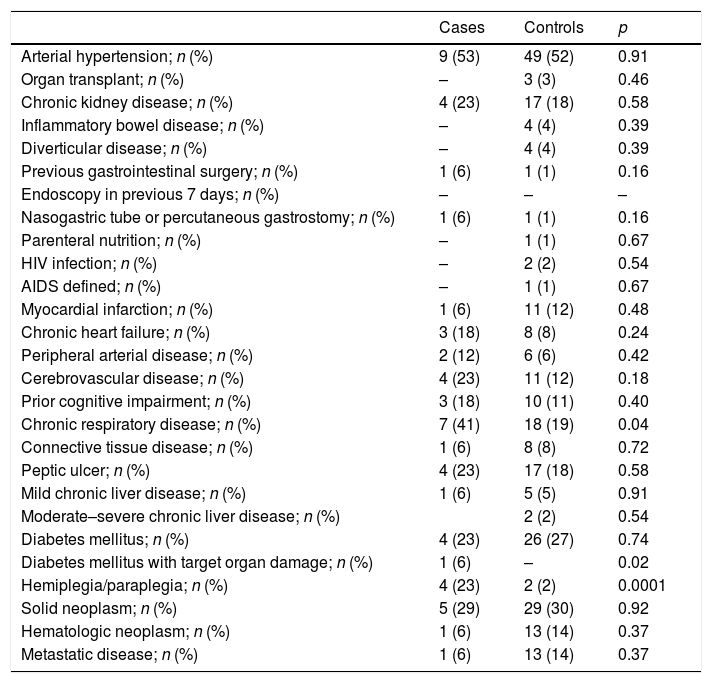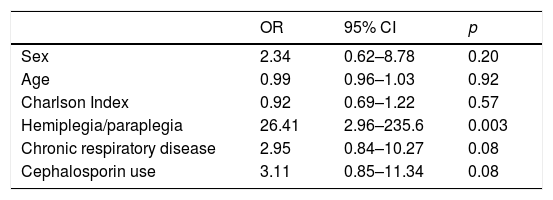There are no data related to the risk factors associated with CDI in a Hospital-Based Home Care Service (HBHCS) of the Spanish health system.
Patients and methodsCase–control study. The cases were patients admitted to the HBHCS between 01/01/2011 and 31/12/2016 who developed CDI. The controls came from the same population, with suspected CDI and CD(−) toxin. We analyzed 82 variables.
ResultsWe analyzed 17 cases and 95 controls, without differences in sex, age or comorbidity. Diarrhea was noted in 94% and 92%, and a percentage of deaths of 18% and 1%, respectively (p=0.001). The presence of hemiplegia/paraplegia (adjusted odds ratio [OR]=26.4, 95% CI 2.9–235.6, p=0.003) showed a significant relationship with CDI, while chronic respiratory disease and the use of cephalosporins did so with marginal significance (adjusted OR=2.9, 95% CI 0.8–10.3 and 3.1, 95% CI 0.8–11.3, respectively, both p=0.08).
ConclusionsActions in the HBHCS directed toward CDI should include a reduction in the use of high-risk antibiotics – according to our results, cephalosporins – especially in patients with specific comorbidities, such as hemiplegia/tetraplegia or a chronic respiratory disease.
No hay datos relativos a los factores de riesgo asociados a la infección por Clostridium difficile (ICD) en los servicios de hospitalización domiciliaria (SHD) del sistema sanitario español.
Pacientes y métodosEstudio casos-controles. Los casos fueron pacientes ingresados en un SHD entre 1 de enero de 2011 y el 31 de diciembre de 2016, que desarrollaron ICD. Los controles procedían de la misma población, con sospecha clínica de ICD y toxina CD(−). Se analizaron 82 variables.
ResultadosFueron evaluados 17 casos y 95 controles, sin diferencias por sexo, edad o comorbilidad. Se registró diarrea en el 94% y 92%, y un porcentaje de exitus del 18% y 1%, respectivamente (p=0,001). La hemiplejia/paraplejia se asoció significativamente con la ICD (odds ratio [OR] ajustada=26,4; IC 95%: 2,9-235,6; p=0,003), mientras que la enfermedad respiratoria crónica y el uso de cefalosporinas presentaron una significación marginal (OR ajustadas de 2,9 [0,8-10,3] y 3,1 [0,8-11,3], ambas p=0,08).
ConclusionesLas acciones en el SHD frente a la ICD deberían incluir una reducción en el uso de antibióticos de riesgo—según lo observado, las cefalosporinas—especialmente ante ciertas comorbilidades, como una hemiplejia/tetraplejia o una enfermedad respiratoria crónica.









